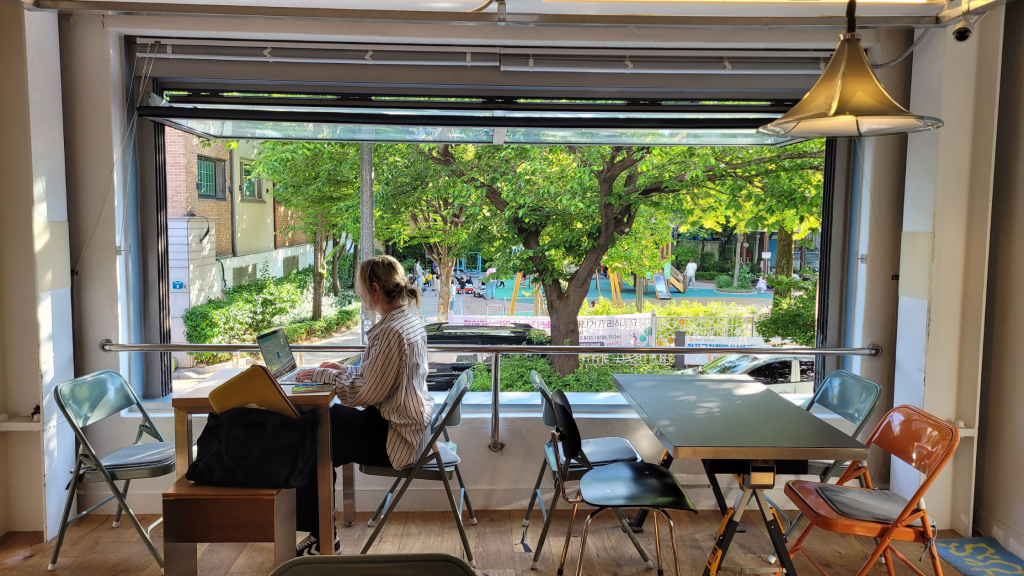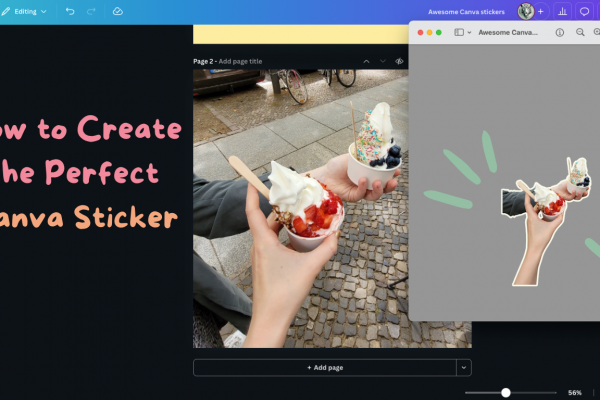Your Office is Calling… from a Beach in Bali?
Okay, sorry. The Bali thing is rather cliché. But remember that dream of working from a cafe in another country? Or waking up, having a morning coffee, and then starting work while watching the sunrise over Tokyo’s skyline? Workations aren’t just for digital nomads anymore. They’re for anyone who wants a little more adventure in their life while maintaining their career momentum.
I’ve been lucky enough to turn this dream into a reality multiple times, especially with my trips to South Korea and Japan. And let me tell you, there’s nothing quite like explaining to your German colleagues during a Monday morning video call that you’ll be eating 떡볶이 Tteokbokki for dinner while they’re enjoying their lunch break. The 7-hour time difference creates some wonderfully absurd moments that become the best stories later.
But here’s the thing—workations aren’t all Instagram-worthy laptop shots and perfectly frothy lattes. They require serious planning, clear communication, and a hefty dose of flexibility. Done right, though, they’re absolute game-changers for your productivity, creativity, and overall happiness. That’s exactly what this workation guide will help you achieve.

Why Workations Are More Than Just a Trend
The concept of working remotely while traveling has exploded in recent years, and for good reason. Companies are recognizing that happy, inspired employees are productive employees. When you’re energized by new surroundings, different cultures, and fresh perspectives, that energy translates directly into your work.
But workations offer benefits beyond just personal satisfaction. They can help you develop crucial skills like adaptability, cross-cultural communication, and problem-solving under pressure. Plus, they’re an excellent way to test the waters for longer-term remote work arrangements or even international relocations.
The key is approaching your workation strategically rather than just winging it with a laptop and a prayer. This comprehensive workation guide will walk you through everything you need to know.
Workation Planning: Your Pre-Trip Checklist
Before you book that flight and start dreaming about working from Korean coffee shops (which, by the way, are absolutely incredible for this), you need to run through some essential questions to ensure your workation is both productive and enjoyable:
Time Zone Compatibility: The Make-or-Break Factor
This is probably the most crucial consideration, and it’s where I learned some hard lessons during my first workation to Seoul. The 7-hour time difference with Germany meant that when I was having dinner at 8 PM, my colleagues were just finishing their lunch break and getting back to afternoon meetings.
Ask yourself: What’s the time difference, and how will it affect your daily workflow? Will you need to work nights to maintain overlap with your team, or can you shift to an earlier schedule? Some time differences work beautifully—others require significant lifestyle adjustments.
During my time in Japan, I often found myself working until midnight or 1 AM to catch the tail end of the German workday. This meant I needed accommodations that supported late-night work sessions, which brings us to our next point.
Internet Reliability: Your Digital Lifeline
Nothing kills a workation faster than unreliable internet. And I’m not just talking about speed—consistency matters even more. That Instagram-worthy beachfront cafe might have terrible WiFi that cuts out every ten minutes.
Do your research thoroughly. Read recent reviews specifically mentioning internet quality, and don’t just rely on “free WiFi” promises. Look for accommodations that provide speed test results or have dedicated work spaces.
Here’s something that blew my mind: the internet in South Korea and Japan is phenomenally fast and reliable. I’m talking about consistent speeds that put most European connections to shame. Seoul’s cafe culture is built around people working and studying for hours, so the infrastructure is designed to support it. But this level of connectivity isn’t universal, so always verify before you commit.
Workspace Considerations: Beyond the Laptop-on-Beach Fantasy
Let’s be realistic—you’re not going to be productive working from a beach lounger. You need a proper workspace, and the definition of “proper” varies depending on your work style and requirements.
Consider these options:
- Hotel or Airbnb with dedicated desk space: This was essential for me during late-night work sessions when cafes were closed
- Local coworking spaces: Great for networking and maintaining professional boundaries
- Cafe culture: Perfect if you’re in a country like South Korea where working from cafes is normalized and welcomed
I always chose Airbnbs with proper desk setups because I knew I’d be working odd hours. There’s nothing worse than trying to take an important video call while hunched over a coffee table at 11 PM.
Legal and Practical Considerations
Don’t forget the boring but essential stuff:
- Visa requirements: How long can you legally stay and work?
- Tax implications: Extended workations might have tax consequences
- Company policies: Does your employer allow international remote work?
- Technology requirements: Will you need a VPN? Special software? Your IT department should provide country-specific guidance, especially regarding data privacy requirements.
And don’t worry. Usually, those legal questions will be answered by your company (at least in Germany). For example, my former employer worked with an agency that took care of a country’s risk assessment, calculated tax implications, took out travel insurance for me etc. It really made the whole process super easy.

Essential Workation Guide: 5 Tips to Rock Your Remote Work Adventure
Tip #1: The Calendar is Your Best Friend
Your colleagues don’t automatically know you’re not in the same timezone, and they might think you’re just ignoring their 9 AM pings when you’re actually fast asleep. This communication gap can create unnecessary tension and missed opportunities.
The solution is comprehensive calendar management. Don’t just block out your unavailable hours—clearly show your available ones too. If you’re working the “night shift” from Seoul, mark your calendar with specific availability windows like “Available for Meetings: 10 PM – 2 AM CET.”
Update your calendar and share important info and your new schedule with your team, including:
- Daily availability windows
- Best methods for reaching you urgently
- Regular check-in times
- Any recurring meetings that might need rescheduling
Tip #2: Communication is Queen
Nothing kills a workation faster than a surprise “urgent” meeting scheduled during your exploration day, or team members who feel left in the dark about your availability and progress.
Start communicating about your workation plans weeks in advance, not days. Have detailed conversations with your manager and team about:
- Expectations for availability: Be specific about response times and communication channels
- Project timelines: How will your travel affect current deadlines?
- Handover procedures: What happens if something urgent arises during your offline hours?
- Regular check-ins: Schedule consistent touchpoints to maintain team cohesion
One thing that worked incredibly well for me was starting team meetings with a quick cultural share. I’d spend two minutes showing my colleagues something interesting from my location—like the time I took a 막걸리 makgeolli (Korean rice wine) making class and had a massive fermentation jug bubbling under my sink. These moments humanized the distance and actually strengthened team relationships.
Tip #3: Don’t Forget to Actually Take a Vacation
This might sound obvious, but it’s surprisingly easy to fall into the trap of just working from a different desk. If you’re not experiencing the local culture, trying new things, and actually disconnecting from work occasionally, you’re missing the entire point of a workation.
Schedule actual vacation days within your workation period. Plan specific activities that require you to be completely offline. Book that temple stay in Korea, sign up for the Tokyo food tour, or reserve that trip to Jeju Island. Having concrete plans makes it harder to rationalize working through your free time.
Set boundaries with yourself. Just because you can work from anywhere doesn’t mean you should work everywhere.
Some German companies offer the option to purchase additional vacation days, which can be perfect for extending a workation. If your company offers this benefit, it’s worth the investment for a more balanced experience. Of course, “saving up” your regular vacation days also works.
Tip #4: Document Everything
When you’re not in the same room (or country) as your team, asynchronous work becomes crucial. If you’re the only person who knows the status of a project or the context behind a decision, productivity grinds to a halt the moment you’re offline.
Make documentation your obsession, not just your habit. This means:
- Project status updates: Regular, detailed reports that anyone can understand
- Decision logs: Record not just what was decided, but why and by whom
- Process documentation: Step-by-step guides for anything you handle regularly
- Contact information: Local emergency contacts and alternative communication methods
Use collaborative tools that your entire team can access and update. Whether it’s Notion, Confluence, or even shared Google Docs, the platform matters less than the consistency of use.
This documentation strategy serves a dual purpose: it keeps your team productive while you’re offline, and it makes your own re-entry much smoother. Instead of spending your first day back trying to remember where everything stands, you can jump right back into productive work.
Note: Please check with your company IT security team which tools are okay to use for your team.
Tip #5: Create a Routine
The line between “work” and “vacation” becomes dangerously blurry when you’re in an exciting new place. Without clear boundaries, you might find yourself working 12-hour days because you’re too stimulated to stop, or conversely, struggling to focus because there’s so much to explore.
Establish new routines that help your brain switch between work mode and exploration mode:
Morning rituals: In Seoul, many cafes aren’t open early and, personally, I prefer quiet work in the morning. So, I usually settled on preparing breakfast at home, checking emails, projects updates, getting 2-3 hours of deep work in etc.
Work boundaries: Set a clear end-of-workday ritual. Maybe it’s closing your laptop with intention, taking a specific route to dinner, or changing from work clothes into exploration gear. Physical actions help reinforce mental transitions.
Weekend protection: Be extra vigilant about maintaining work-life balance on weekends. It’s tempting to “just check one email” when you’re feeling guilty about being in an amazing place, but this slippery slope can ruin your entire experience.
Evening wind-down: Develop a routine that helps you mentally separate from work stress. This might be journaling about your day’s experiences, planning tomorrow’s adventure, or simply taking a walk through your new neighborhood.
Common Workation Guide Questions: Challenges and Solutions
Let’s address some challenges that Instagram doesn’t show you:
Loneliness and isolation: Working alone in a foreign country can be surprisingly isolating, especially if you’re naturally social. Combat this by choosing accommodations near coworking spaces, joining local expat groups, or planning regular video calls with friends and family.
Cultural barriers: Simple tasks like grocery shopping or finding a reliable pharmacy become complex when you don’t speak the language. Build extra time into your schedule for these everyday challenges.
Technology hiccups: Despite the best planning, technology fails. Have backup plans for internet outages, device failures, and software incompatibilities.
FOMO and overcommitment: When everything around you is new and exciting, it’s easy to overbook your free time. Leave space for spontaneous discoveries and rest.

Making It Work Long-Term
If your first workation goes well, you might want to make this a regular part of your work life. Here’s how this workation guide recommends building sustainable remote work practices:
Start small: Begin with shorter trips (1-2 weeks) to test your systems and preferences before committing to month-long adventures.
Build relationships: Develop connections with local coworking spaces, reliable cafes, and fellow remote workers in your favorite destinations.
Invest in quality gear: Good noise-canceling headphones, a portable laptop stand, and reliable adapters become invaluable investments.
Learn from each experience: Keep a workation journal noting what worked, what didn’t, and how you can improve next time.
The Bottom Line: Planning Makes Perfect
A successful workation requires the same level of planning and professionalism as any other work arrangement, just with more exciting scenery. The key is approaching it strategically: communicate clearly, prepare thoroughly, and maintain boundaries between work and exploration.
When done right, workations offer incredible benefits: renewed creativity, cultural perspective, improved language skills, and memories that last a lifetime. Plus, you’ll have the best video call backgrounds and the most interesting answers to “How was your weekend?”
The world is increasingly accommodating to remote work arrangements, and companies are recognizing the value of happy, inspired employees. If you’ve been dreaming about working from that cafe in Seoul or taking client calls with Mount Fuji in the background, there’s never been a better time to make it happen.
Whether you’re planning your first workation or your tenth, remember that the goal isn’t just to work from a different location—it’s to enrich your life, broaden your perspective, and return home with new energy and insights that benefit both you and your career.
Ready to start planning? The world is waiting, and your laptop is portable for a reason.
Planning your own workation adventure? For reliable internet connection during your workation, consider getting an eSIM through Saily for unlimited data, and NordVPN can help you stay secure online while accessing your familiar streaming services after those late-night work sessions. These tools have been essential during my own international work adventures and can help ensure your workation stays productive and connected.
*Affiliate link: I get a commission if you decide to make a purchase through my links, at no cost to you.

